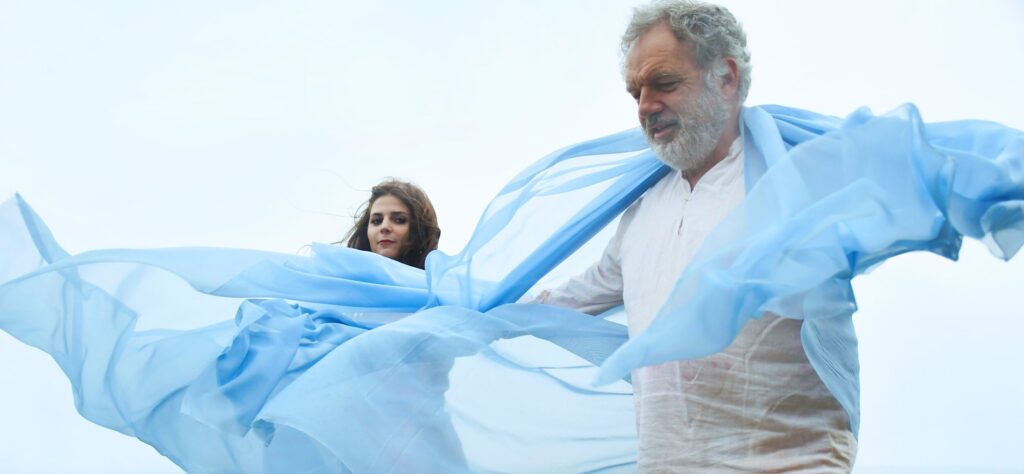Adapting ‘metre’ – Icara indoors

Possibly the first in-person and indoor theatrical performances since lockdown, Theatre Tiresias welcomes us back to the theatre with its inaugural show Icara: a play by Ned Dickens.
First performed on a picnic table at the 2000 Toronto Fringe Festival, the play has made quite a journey to its 2020 conception at the Tett Centre for Creativity and Learning. The Rehearsal Hall has been transformed into the prison tower Icarus and Daedalus took off for their infamous plight. While playwright and director Dickens seeks to explore how even ancient stories can have surprise endings, it’s more of a poetic rendering of the classical Greek myth than it is a reimagining.
The moment we enter the theatre space, we are plunged into the sights and sounds of exile in Ancient Greece, reality and fiction feeding off each other. The concentric layout of the stage and seating are reminiscent of the amphitheatres from antiquity, while the placement of and plexiglass between audience members grounds us in the sanctity of the ability to share the space. Theatre Tiresias is not only connecting the crowd with each other, but the Kingston area as a whole. Collaboration with the community included Tall Ship Expeditions Canada, who provided set and costumes, and Queen’s student Grace Irwin, who both stage managed and lighting designed the show. Different corners of Kingston can be found in one room, where the lyrical text finds its current home.
But when it came to the text, the heightened language of the script was honoured to a fault. It was the primary element reflected in the production when really the poetry could’ve taken a life of its own. At times when the director is also the playwright, there’s no friction behind the intention fueling the narrative. When you witness the playwright’s intent to the fullest degree, there’s no work to be done for performance, production, or patron—the choices are made for you. If nothing more is done with what the script or story asks for, what theatre reflects back to society is its appearance intact.
Sometimes we subconsciously tell stories we don’t mean to tell. The familial dynamic between Icara and Daedalus was intercepted by a dissonant chemistry between the actors, coding Daedalus’ intent and Icara’s innocence with an almost incestuous layer. Icara has been posing as her father’s son rather than daughter in order to escape [sacrifice to the Minotaur, revenge on her father] and men with bad intentions. The issue is, puberty is setting in and she is nearing the point where she can no longer easily present as his son. Actress Siobhan McMahon may be a young adult female, but she does not communicate young enough to reflect those stakes. And if it’s a little weird to hear how up in arms Daedalus is about protecting his daughter’s “sex”, it’s weirder to hear how much she reminds him of her mother.
Because the intentions both MacMahon and Bill Morrow arrived with contrasted from the chemistry that the script was calling for, and from each other, Daedalus is now protective for the wrong reasons. Icara’s defiance was gentle rather than ugly while Daedalus’ tactics were the opposite, but seeing that flipped would’ve highlighted the manipulative nature of his demeanour and Icara’s unwillingness to remain where and who her father wanted her to be. Art cannot be celebrated without multiple perceptions, but that potential emphasizes the need to control the story we are telling about ourselves to others. Here, divergence calls into question whether it’s the script or production that is out of touch with its audience.
It’s not that nothing was happening, but identifiable themes present felt under baked. Greek mythology is riddled with stories of generational legacy and filial piety, and what I wish Icara: a play focused on was the shadow of themselves parents project onto their children. Daedalus wants to make Icara in his image as much as he doesn’t want her to surpass him, his ego manifested as his protection for his daughter. But while he has been put in a prison of his own making, now Icara is growing within the confines of her father—an echo but never a voice.
And yet the play starts with Icara herself. Her words speak of survival and rebellion, but it is not clear what she is fighting against. Is it her father? Her ending? Is it the way her story’s been told, or who it’s being told by? Ultimately, the friction and conflict between and within the two are never present or expressed. And where there lacks intention, misinterpretation creeps in.
Dickens’ script offers a lot to play with, and I wish they played with the text and each other more. Still, it was extremely exciting for everyone involved—stage or seat—to be in the space together again! Two seat islands separated by two metres, and sometimes plexiglass, Theatre Tiresias has set a precedent for how socially distant live performance can occur with safety protocols in place and indoors. The next challenge theatre artists and audiences may face is how to navigate communicating with one another when our facial cues and responses are concealed. Icara: a play reminds its audiences what it is we’re looking for when we return to theatre, allowing us to reflect on the stories we tell and listen to.
